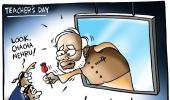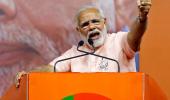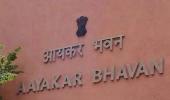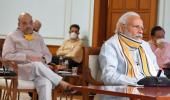Indian elections are won and lost on 'negative' imageries and campaigns, but not certainly on 'negativity' as a political trait and electoral creed, asserts N Sathiya Moorthy.
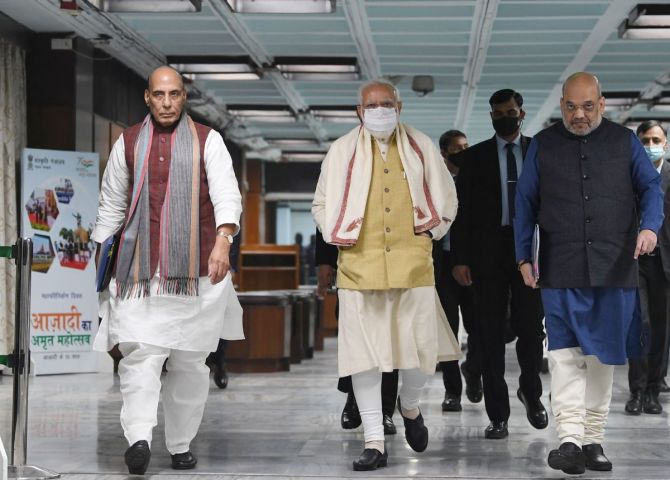
Home and Cooperation Minister Amit Anilchandra Shah and Raksha Mantri Rajnath Singh are also seen. Photograph: Press Information Bureau
Early next year, when fives states vote in assembly polls, the Narendra Modi government's decision to ignore then prime minister Indira Gandhi's leadership and contribution to the nation's decisive victory in what is euphemistically called the 'Bangladesh War' over Pakistan, by itself may not matter as an election issue.
Despite being spread out of across the country, the Congress does not have the delivery mechanism to remind the voter beyond what their spokesmen have already said at news conferences in 'distant' Delhi.
Other anti-BJP parties won't want to market the high-point of the Congress' politico-military administrative calibre for the party.
Yet, like feel-good factors that help political parties, especially those in government, to pile-up positivity, the piled-up negativity that gathers with instances like the wanton omission of Indira Gandhi's name and contributions to the war in the golden jubilee year of Bangladesh's creation.
It is the sum total of their assessment of a party in power at the national-level in the media-savvy electorate in the 21st century India that will decide the mood and choice, especially of 'swing voters', whose numbers seem to be increasing unlike in 2014 and 2019.
Such a turn alone had helped the Opposition Congress in Elections-2004, when the middle-of-the-road became unconvinced by the ruling Vajpayee-centric, Advani-led BJP-NDA's 'India Shining!' campaign.
It does not happen overnight, but there are occasions when circumstances conspire against the party and leader in power, as Indira Gandhi and her Congress party found for themselves in Elections-1977.
They did not plot for the Emergency as a way of quelling Opposition protests, whose numbers and intensity were increasing across the country, that too after she had won the Bangladesh War for the nation, and whose positive geo-political and geo-strategic impact India continues to enjoy.
The Allahabad high court judgment, unseating Indira Gandhi from the Lok Sabha -- which anyway the Supreme Court threw out later -- 'conspired' for her to assent to her upstart of a politician-son in Sanjay Gandhi's decision in the matter.
Today, the nation remembers Sanjay Gandhi for all the wrong reasons, dating back to those eventful seventies.
The younger generation does not know him, but even the older generation that saw him at 'work', may not remember that he was a pioneer in protecting Nature.
Using the 'powers vested in him' during the Emergency, Sanjay Gandhi introduced and popularised tree-planting across the country, just as his wife Maneka Gandhi is now known as a prime and prominent animal rights activist, her activism blunting her political career in a way.
There is no better candidate for Shakespeare's lines, 'The evil that men do live after them, the good is oft interred with their bones' than Sanjay Gandhi, it would now seem.
The BJP's over-use of Nehru's name, more than Indira Gandhi's or others from the family, barring the current Congress leadership of Sonia Gandhi, seems to be losing its indefensible charm for the new generation voters, at least.
The older generation that sang Manmohan Singh's praise when he was finance minister saw in him everything evil in Indian politics when he was into his second term as prime minister.
Such is the power of political campaigns in the 21st century India that Singh who had won his second term (2009-2014) for the party-led UPA alliance, was also used by the BJP to take pot-shots at the Nehru-Gandhi leadership that had dominated politics and political administration since Independence.
There were evil spots in Indira Gandhi's times. The Emergency may be the best remembered of them.
Her conscious encouragement for her party's 'Aaya Ram, Gaya Ram' kind of political defections was possibly worse as it continued unabated even when she returned to power in 1980, after losing the post-Emergency Elections-1977 in an unprecedented way.
Her socialism-inspired decisions on bank nationalisation and privy-purse abolition were all 'frauds' committed on the Constitution, as the terminology goes.
People do not remember them, but in her own time, it was the cumulative effect of her decisions that impacted the political space available to her in her own time.
But even her worst critics, and those of Jawaharlal Nehru, questioned their contributions to post-Independence India's leaps of faith, into becoming a modern democracy, a modernised nation, which combined industrialisation and farm-growth as twin-tools and targets for development.
It is this that the Modi-led BJP keeps returning to even after seven years in office without being able to project the great positivity under their continued administration.
The 1962 military debacle against China is the lowest point in Nehru's prime ministerial career.
But the more the BJP harps on it and insinuates him as an inept leader, non-committed sections of their youth voters seem to be digging up history on Google, Wikipedia and wherever a touch of the button plays back the past for them.
There they learn how General K M Cariappa, since elevated to field marshal, had advised against a two-front war, against Pakistan and China, as India was already fighting one in 1948, against the former not long after Partition violence and Independence in the previous year.
General Cariappa said that the Indian armed forces did not have the resources for the same.
This was the underpinning point in Nehru's decision to go soft on China.
Yes, like Modi and less like Indira Gandhi, he too was a one-man decision-making machine.
His followers inside his Cabinet and outside, including the civilian bureaucracy, actually thought that he was the greatest thinker of their times, a diplomat par excellence.
Yes, in matters of protocol, yes, but not in decision-making.
This is what seemed to have happened to Modi's decision on demonetisation, his celebrating the GST launch, of all petty things, as a second Independence, holding a midnight Parliament session for the purpose, and also with varied decisions like the Central Vista, when the nation wants food and jobs even more.
It was under near-similar politico-administrative environment that Nehru swung from one end to the other on the China front.
He would talk Panchsheel and non-alignment and still insist that India would not negotiate the McMahon Line, the near-imaginary line dividing Assam and Tibet.
Likewise, his government took the risk of flying in troops to Srinagar in the middle of night without landing lights et al, and yet through weeks and months of discourse, took the 'Kashmir issue' to the UN, where it is still technically rotting.
But then, as with General Cariappa's advice on a two-front war, Nehru had no options, it would seem.
Those were the days, the national Budget was in low three-figures, say, Rs 171.15 crores for seven months in fiscal 1947-1948. Already, the expenditure stood higher at Rs 197.29 crores.
In comparison, for fiscal 2014, the year Modi came to power, the Budget stood at Rs 17,94,892 crores.
Sure, critics of the Nehru-Gandhi leadership would not claim that all of it happened after Modi came to power, or at least because Atal Bihari Vajpayee had been at the helm for a term or two (1998-2004).
The question remains if the BJP Centre's sidelining of Indira Gandhi in the Vijay Diwas celebrations was only in line with the party's over-kill, starting with the construction of a war memorial and capital city, the latter in the form of the up and coming Central Vista in New Delhi.
Or, did it also have an unsaid message for the Congress Party for black-listing and blackening the image of V D Savarkar in the Mahatma Gandhi assassination case, even after the courts had acquitted him of conspiracy charges?
The latter proposition may sound far-fetched but then the way the BJP-centric Hindutva forces have been besmirching and belittling the name and public image of the Nehru-Gandhi leaderships of the nation, post-Independence, even where it did not fit in, makes the extension of the imagery to such a course, as well.
Be it as it may, the BJP especially as the ruling party at the Centre and also in key central Indian states need to remember that even seven years after capturing power, and after breaking Vajpayee's record for the longest term for a non-Congress government at the Centre (with two-plus years to go for Elections-2024 for the Lok Sabha), should stick to name-calling alone as the mainstay of its politico-electoral campaigns, has a message of its own.
The BJP should now come out, and market its positivity, especially in government at the Centre, and none else, if it wants the voters on its side in Elections-2024, too.
Yes, Indian elections are won and lost on 'negative' imageries and campaigns -- but not certainly on 'negativity' as a political trait and electoral creed.
In comparison, Indian voters have always looked at positives, even more, in the form of voting again for an incumbent government, or voting it out.
The dividing line between positivity and negativity in political campaigns and voters' approach is very thin, but it does exist and is thick and strong, when the voter decides enough is enough.
Even today, the Modi-centric BJP at the Centre presents a picture of political stability unmatched since the days of Jawaharlal Nehru and the early innings of Indira Gandhi.
Rajiv Gandhi as PM had the largest parliamentary support, but against V P Singh, he behaved as if he were in a minority.
This mindset might have been an added factor for him to promote and pass the anti-defection law, which still remains controversial in implementation and interpretation.
Modi in his time now seems to be deploying raids and searches with a near-similar mind-set, which does not go down well with the voter, and ends up creating sympathy for the 'victim', whose corrupt ways the voter otherwise does not approve of.
In the case of regional parties, as the Samajwadi Party's Akhilesh Yadav has said after poll-eve raids on his party colleagues in native UP, they begin enjoying it, wanting it after a time.
If nothing else, in this case, after similar raids had silenced Yadav's BSP rival in Mayawati long time ago, there are fewer chances for the anti-BJP votes to get split, if ever the voter wants the BJP out.
It happened in the Lok Sabha polls of 1996.
The Indian voter would not want what he saw as the inefficient and corrupt Congress government of Prime Minister P V Narasimha Rao out.
But he did not want the BJP, which was at the Centre of 'Ayodhya demolition' and post-demolition communal violence and consequent Mumbai blasts, in power.
The voter did not care who would rule them, next.
They were bothered only about whom all they did not want.
Post-poll, H D Deve Gowda from Karnataka became prime minister.
It was one up on the post-Emergency Elections-1977, when an alternative coalition in the form of a single party, namely, the Janata, was there on paper, pre-poll. Not so in 1996!
N Sathiya Moorthy, veteran journalist, political analyst and author, is Distinguished Fellow and Head-Chennai Initiative, Observer Research Foundation.
Feature Presentation: Aslam Hunani/Rediff.com
